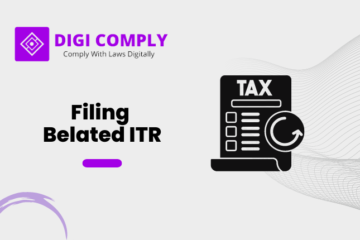Income Tax Return (ITR) is a document filed by individuals with the income tax department, declaring their income earned during a specific financial year. It includes details of income, deductions, and taxes paid or owed by the taxpayer. Filing ITR is mandatory for individuals meeting certain income criteria set by the government.
Why is filing ITR important?
Filing ITR is not only a legal obligation but also offers several benefits. It serves as proof of income and is required for various financial transactions such as applying for loans, visas, or government subsidies. Additionally, filing ITR enables individuals to claim tax refunds, carry forward losses, and maintain a clean financial record.
Filing income tax returns (ITR) is a crucial financial responsibility for individuals. It helps ensure compliance with tax laws and allows individuals to report their income, claim deductions, and avail of tax benefits. However, navigating the intricacies of tax filing can be challenging, especially for those unfamiliar with the process. In this comprehensive guide, we provide you with major precautions to know while filing ITR for individuals. By following these precautions, you can enhance your tax filing experience and avoid potential errors or penalties.
1. Understand the Applicable Tax Slabs and Rates
Before filing your ITR, it is vital to familiarize yourself with the prevailing tax slabs and rates. Tax slabs determine the income brackets and the corresponding tax rates applicable to each bracket. By understanding the tax slabs, you can accurately calculate your tax liability and plan your finances accordingly. Keep in mind that tax slabs and rates may vary based on the assessment year, so always refer to the latest updates from the tax authorities.
2. Gather and Organize Your Financial Documents
To file your ITR accurately, it is essential to gather and organize all relevant financial documents. These may include:
– Form 16 or salary certificates from your employer
– Bank statements reflecting interest earned on savings accounts or fixed deposits
– Proof of investments and deductions, such as receipts for insurance premiums, medical expenses, or contributions to provident funds
– Details of any capital gains from the sale of assets
– Any other income-related documents, such as rental income or income from freelancing
By having these documents readily available, you can ensure that your tax filing process proceeds smoothly and minimize the chances of overlooking any crucial details.
3. Choose the Correct ITR Form
The Income Tax Department provides different ITR forms catering to various categories of taxpayers and their income sources. It is crucial to select the correct ITR form that aligns with your income profile. Choosing the wrong form can lead to discrepancies and potential scrutiny from the tax authorities. Refer to the guidelines provided by the tax department or consult a tax professional to determine the appropriate ITR form for your specific situation.
4. Accurate Reporting of Income and Deductions
While filing your ITR, accuracy is paramount. Ensure that you report all your income from various sources, including salary, business profits, capital gains, and interest income. Failing to report any income can attract penalties and legal consequences. Simultaneously, make sure to claim all eligible deductions and exemptions accurately. This includes deductions under various sections of the Income Tax Act, such as Section 80C for investments in specified instruments and Section 80D for medical insurance premiums.
5. Validate Bank Account and PAN Details
To receive timely tax refunds, it is crucial to validate your bank account details and Permanent Account Number (PAN) during the tax filing process. The Income Tax Department typically issues refunds through electronic transfers, so providing accurate bank account information is vital. Additionally, ensure that your PAN is correctly mentioned in the ITR form to avoid any discrepancies. Any errors in these details can lead to delays or non-receipt of refunds.
6. Review and Verify Your ITR Before Submission
Once you have filled in all the necessary details in your ITR form, it is crucial to review and verify the information before submission. Carefully check all the figures, ensure proper calculations, and validate the data against your supporting documents. This step is essential to avoid any inadvertent errors that may arise due to typos or miscalculations. Take the time to review your ITR thoroughly to maintain accuracy and compliance.
7. Timely Filing and Compliance
Lastly, ensure that you file your ITR within the designated due dates. Filing your taxes after the deadline can attract penalties and interest charges. Stay updated with the tax department’s notifications to know the applicable due dates for your specific assessment year. Compliance with these timelines demonstrates your responsible approach to tax filing and helps you avoid unnecessary financial burdens.
Frequently Asked Questions (FAQs)
- Q: What happens if I miss the ITR filing deadline? Ans: If you miss the ITR filing deadline, you may have to pay penalties and interest on the tax amount due. It is advisable to file your returns within the specified timeframe to avoid any unnecessary financial burden.
- Q: Are there any benefits of filing ITR even if my income is below the taxable limit? Ans: Yes, there are several benefits of filing ITR even if your income is below the taxable limit. It helps maintain a clean financial record, acts as proof of income, and may be required for various financial transactions in the future.
- Q: Can I revise my ITR after filing it? Ans: Yes, you can revise your ITR if you have made any errors or omissions in the original filing. The income tax department allows taxpayers to file a revised return within a specified time frame.
- Q: Is it necessary to take professional help for filing ITR? Ans: While it is not mandatory to seek professional help, it is advisable to consult a tax professional if you are unsure about any aspect of the ITR filing process. They can provide expert guidance, ensure accurate reporting, and help you maximize your tax benefits.
- Q: What should I do if I receive a notice from the income tax department after filing my ITR? Ans: If you receive a notice from the income tax department, carefully review the details mentioned in the notice and respond within the specified timeframe. Seek professional help if needed to address any queries or concerns raised by the tax authorities.
Conclusion
Filing ITR can be a difficult task, but with the right knowledge and guidance, it becomes a manageable process. By following the key tips mentioned in this article, you can file your ITR accurately, maximize your tax benefits, and ensure compliance with tax regulations. Remember to stay organized, keep track of deadlines, and seek professional help if needed. Filing ITR is an essential step towards financial well-being and should be approached with diligence and accuracy.
If You have any queries then connect with us at support@legalsuvidha.com or info@digicomply.in & contact us & stay updated with our latest blogs & articles





